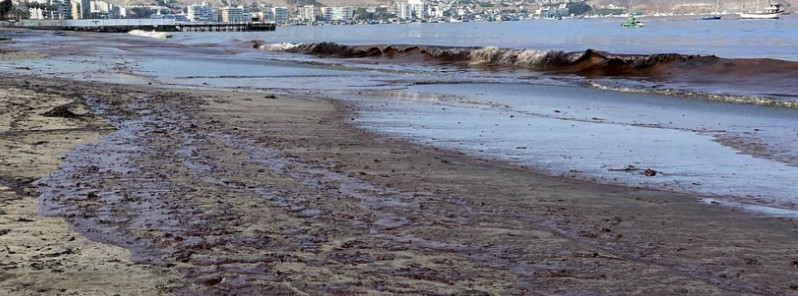Ecological disaster in Peru after tsunami waves hit oil refinery

Tsunami waves caused by the massive eruption at Hunga Tonga-Hunga Ha'apai volcano in Tonga on January 15, 2022, hit a tanker that was unloading crude oil at a refinery in Lima, Peru, causing an ecological disaster. The incident took place in the district of Ventanilla at Repsol's La Pampilla refinery — the largest refinery in the country.
The Peruvian government said the oil spill caused by the event harmed animal and plant life in protected zones over a combined area of 18 000 km2 (6 950 mi2) around islands and fishing regions.1
"This is the worst ecological disaster that has occurred around Lima in recent times and has seriously damaged hundreds of fishermen's families. Repsol must immediately compensate for the damage," the country's Ministry of Foreign Affairs said.

"There is a massacre of all the hydrobiological biodiversity," said Roberto Espinoza, leader of the local fishermen.2 "In the midst of a pandemic, having the sea that feeds us, for not having a contingency plan, they have just destroyed a base of biodiversity."
Repsol officials estimate that around 715 449 liters (6 000 barrels) of oil were spilled.
Peru's environmental assessment and enforcement agency estimates that some 18 000 m2 (193 750 feet2) of beaches have been affected by the spill.
The species most affected by the spill include guano birds, seagulls, terns, tendrils, sea lions and dolphins, said Juan Carlos Riveros, biologist and scientific director in Peru of Oceana.
Aside from 3 fatalities in Tonga, tsunami waves caused by the eruption3 also claimed two lives in Peru — some 10 000 km (6 200 miles) away from the volcano.4
According to Peru's National Institute of Civil Defense (INDECI), the people drowned on a beach located in the Lambayeque region.
More than 20 Peruvian ports were temporarily closed as a precautionary measure amid warnings that the volcano was causing abnormally high waves.
References:
1 Peru says oil spill caused by Tonga waves is an 'ecological disaster' – Reuters
2 The Tonga volcano caused an oil spill on Peru's coast. Fishermen are protesting – AFP
3 Massive eruption at Hunga Tonga-Hunga Ha'apai produces huge shockwave and tsunami, Tonga – The Watchers
4 Two people drowned by abnormally high waves in Peru after Tonga volcano – Reuters
Featured image credit: Municipalidad de Ancon

As to dealing with this capital C catastrophe (NATURE: kick humanity in the balls, next time):
Key bodies involved are the Center for International Forestry Research (CIFOR), the International Union for Conservation of Nature (IUCN), and the Global Landscapes Forum (GLF) (Wikipedia quote) , with no UN executive sub-directorate for concrete action. Another example of the planet’s ecological illiteracy, among many more with no promising holdouts.
The obvious solution to this problem: said unknown UN Agency would dispatch highly qualified emergency response units to all the points of impact. They would provide world-class expertise, micro-materials and omniscient tech, then intense analysis of outcomes in realtime. Personnel, bulk materials and heavy equipment would be mostly recruited from avid local volunteers, in the thousands if necessary, otherwise contracted locally and honestly. Good people are just waiting to serve.
The emphasis would be not so much on physical removal (though that too, where maximally efficient). Emphasis would to to BIO-REMEDIATION: infecting the oil with bacteriophages tailored to that oil-temp-salinity mix.
I’m done talking; this page will crash soon unless I post now.
You and yours be well.